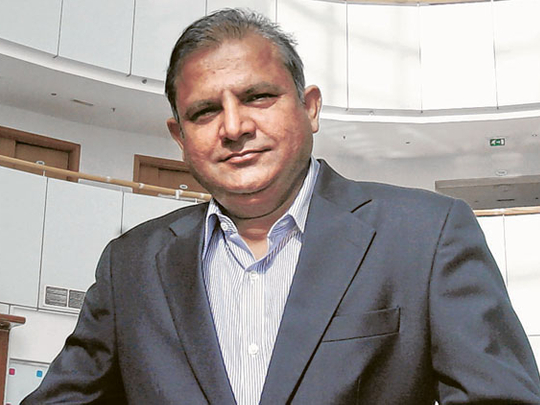
Dubai: For most GCC residents, facilities management comes in the shape of a watchman or security guard.
But for freehold homeowners it comes in the form of a nightmare — big, fat service charges.
The facilities management sector in the GCC is expanding fast due to the delivery of a large pool of properties that needs maintenance, as well the need for sustainable solutions.
Until recently, most homeowners were fighting hefty service charges levied by master developers, which ranged from Dh12 to Dh25 per square feet per annum.
This adds up to as much as Dh25,000 worth of charges for an apartment of 1,000 square feet for the cost of cooling, cleaning, maintenance and security.
Tariq Chauhan, Group Executive Director and board member of EFS Facilities Services, one of the largest of its kind in the region, said this could be done for less than Dh3 per square foot.
He said his company had developed a cost effective, comprehensive facilities management model for property owners.
"Facilities management is operations and management of assets," Chauhan said.
"This involves maintenance of building fabric, plant room, building management system, lifts, CCTV and other equipment with an objective of increasing longevity of assets and sustainable FM services.
"About 50 per cent of FM is utilities, the rest are mechanical, electrical and plumbing (MEP), cleaning and security. It is strongly recommended that operators be involved in the design stage of a building. Unfortunately, FM companies are usually called in at the handover."
He says the industry is moving from the nascent stage to maturity. FM operators must emphasise real FM issues such as the need for a "sinking fund" or a capital life cycle replacement fund that ensures raising financial provisions in advance to manage the fabric of the facility and refurbishment during the life cycle. However, the key challenge for the industry is about FM awareness and getting the right skills set.
In an exclusive interview with Gulf News, Chauhan expressed his thoughts on this important issue. Excerpts:
Gulf News: What is the current state of the facilities management sector? How are large FM players coping with the current situation?
Tariq Chauhan: Although the FM industry is showing optimistic growth patterns there is an ever-increasing pressure to decrease FM costs.
Presumably, all large FM companies are pruning their costs. Due to the recession there is a compelling need for FM companies to review their existing management and manpower costs as well as to cut all other outsourcing costs.
How do you describe FM business? Why is it so important?
FM is about overall sustainability and longevity of assets and building fabric, through qualitative maintenance. FM provides a sustainable qualitative lifestyle support in regard to a safe and healthy environment as well as rationalising all related costs for end users and property owners.
Do residents here understand FM and its importance?
There is an increasing awareness surrounding FM, however there is still a great deal to be done with regard to educating people on the benefits and importance of FM.
FM is all about the sustainability of conventional building maintenance models and frameworks.
As well as this, the concept of sinking funds and capital life cycle replacement needs to be elaborated so that the full benefits of FM are achieved.
FM needs to be involved right at the design stage and thereafter from construction and commissioning to the handover stage.
EFS believes that substantial benefits can be derived in the rationalisation of long-term costs including service-level fees and if appropriate, FM guidelines are followed in the beginning stage.
What are your plans to spread awareness — environment, sustainability and responsible living?
EFS now has a specialised training centre with the intention of promoting workshops and courses on sustainable FM models, especially in freehold sectors in the middle income group housing sector.
As a responsible and leading FM service provider, it is EFS's mission to provide qualitative FM services based on transparent and prudent commercials. The lead developers and master community tenants associations must a take a lead to educate communities on the FM benefits and related costs. The perception of high FM costs needs to be tackled through awareness, especially in freehold communities where there is pressure on tenants' associations to cut costs.
Are there enough FM players to manage such a huge pool of new supplies?
The FM industry is likely to grow at an exponential rate, however the FM industry in the Middle East is at a nascent stage with an ever-evident requirement for more, credible, FM service providers.
EFS foresees the entry of many large international FM service providers, with the local FM service providers having the opportunity for vertical and horizontal growth.
Do you anticipate a strong growth in the FM sector the coming years?
Post "construction boom", a large quantity of property assets are currently being completed and in the process of handover.
FM service providers are now stepping in to ensure sustainable FM initiatives. In addition to this, new realty and strata laws are also setting FM benchmarks and road maps for sustainable FM models in the Middle East. Besides, the infrastructure investment projects in the UAE, Qatar and Saudi Arabia are matured and require scalable and challenging FM solutions.
Many property buyers feel developers are using FM as a money-making scheme. What do you think?
This is not true as FM costs are usually not understood, as value preposition of FM needs elaboration. FM ensures longevity of assets that does matter for developers although often over-looked as this concern is left to house owners.
FM ensures substantial reduction of utility and other costs, as well as the sustainability of lifestyle, health, safety, environment and quality. Thus, FM ensures synchronisation of these elements and is therefore essential in prolonging the life of any property.
The concept of lifecycle replacement fund, commonly known as sinking funds, needs to be understood and developers or building owners must understand the need to provide for this.
Developers have their objective to sell, therefore often cutting the core FM costs so as to undercut service charges to make their selling preposition attractive. This is now mitigated through Real Esttate Regulatory Agency (Rera) guidelines.
Landlords want to drive the costs down, whereas their tenants want sustainable service standards.
Therefore as responsible FM players EFS ensures a balance is maintained between expectations and ultimate FM sustainability.
What do you think is the ideal service charge range should be?
There are no standard measurements to ascertain this, however a standard service-charge model for core FM services (mechanical, electrical, plumbing, cleaning, security) should not vary from Dh3 to Dh6 per square foot.
This range is dependent on many factors, including the life of the property, common areas, the quality and type of the property assets, as well as service level requirements as stipulated by the patrons.
What is the lowest service charge that your company could manage a premise with?
The service charge is dependent upon the type and design of the premises, however EFS provides a market-competitive rate for comprehensive FM services. There are cases when we have gone as low as Dh3 per square foot. However this does depend on the many factors cited above.
Tell us about EFS. How many projects are you managing currently?
Emcor Inc has a $6 billion turnover and is managing projects from hospitals, airports and defence establishments across the USA and Europe.
In the Middle East, EFS currently has more than 90 projects, with a backlog of more than Dh600 million across the UAE, Saudi Arabia, Bahrain, Qatar, Kuwait and now Egypt. EFS' tender pipeline includes defence establishments, airports and mega-city development projects.
In terms of growth, where do you see your order book in five years from now?
Crossing the Dh1 billion mark.
How many employees do you have currently? How many more will you need in the next five years?
EFS currently directly employs around 1,000 employees and around 5,000 through outsourced services.
EFS shall have a workforce of over 5,000 by 2012-2014 and to mitigate the related risks such as emerging labour restrictions and geopolitical developments, EFS' focus is to develop a regional work force with emphasis on nationalisation at different levels. This is one of EFS' biggest challenges — to mobilise such a large workforce based on this pipeline.
In Saudi Arabia, EFS is much above the government stipulated Saudisation mark. In the UAE the EFS training centre, in partnership with a government entity, shall roll out a six month FM course for young UAE national graduates from technical backgrounds.
Are you planning to grow organically or also through acquisition?
A large portion of the pipeline projects are from organic expansion into other GCC countries, with India and Egypt being in focus. Two-thirds of EFS's growth will be organic.
What about plans to go public?
EFS is working on a roadmap with 2014-15 being the target.
How do you plan to make your business more efficient?
EFS is currently restructuring its FM model to suit the growing demands and aspirations of end users, by cost effectiveness, skills development, technical benchmarking and ethnic re-engineering of the workforce. The FM industry must see the writing on the wall that cost rationalisation is the need of the hour as current FM costs needs to be relooked at. The development of skill sets across the technical workforce, the use of CAFM technology and the development of local talent will help to achieve this.
How charges and costs are estimated
Tariq Chauhan gives a break down of the cost allocation for facilities management services.
Service charge structures need to be clearly understood. The major component of the service charge is the utility, which is approximately more than half of the total cost, with the remainder being split.
Service charges are dependent upon the type and design of the asset, however ideally, service charges and building service charges should be as per the following proportions:
- Common area cleaning services (manpower plus consumables): 10 per cent; n Security services: three per cent
- Mechanical, electrical, plumbing (spare parts, tools and equipment): 20 per centn Specialist Subcontractor Services: five per cent, including fire alarm, firefighting, BMS, elevators and escalators, BMU, security systems, generators, third party certification, CCTV cameras, and pest control
- Landscaping: oneper cent
- Facilities management team: two per cent
- Capital lifecycle replacement fund: five per cent,
- Buildings insurance: one per centn Master community service charge (including provision for CLRF): two per cent
- Utilities Costs including DEWA 20 per cent, chilled water capacity 15 per cent, chilled water 15 per cent.
WEALTH OF EXPERTISE
Tariq Chauhan, 45, is a professional entrepreneur with more than 22 years of diverse experience in banking, technology and asset management services.
He is a Harvard Business School graduate with a track record in building and establishing companies in GCC, USA, UK and Asia. Chauhan has served on the board of a number of companies and one of his companies represents a French IT retailing major in the supply chain and retail management business in GCC. Tariq is the key architect of a state-of-the-art property and asset management solution that is being implemented as part of a large development in Kuwait.
He serves on the board of EFS as group executive director responsible for the management of EFS, EFS Group of companies operating across GCC and North Africa.
Tariq's vision is to build EFS into the number one provider of core FM services in the region.
WORKFORCE ITS STRENGTH
From 2003 until 2006, Emcor Facilities Services was operating as the facilities management arm of the Drake and Scull Group. In 2005, EFS separated from Drake and Scull to partner with US firm Emcor Incorporated to establish Emcor Facilities Services, which provides comprehensive FM services.
In 2006, EFS established its operations across the GCC and is now associated with prestigious FM projects across the region including: Jumeirah Lake Towers, Dubai; Abu Dhabi Mall, Abu Dhabi; King Abdullah University of Science and Technology, Jeddah; Bahrain Financial Harbour and Kuwait Audit Bureau.
EFS strengths are its diverse FM portfolio, its regional presence and the cross-section of FM services it delivers. Recently, EFS was awarded a project covering 750 mosques across the Al Ain region in Abu Dhabi, with many new prestigious contracts having been awarded since.
EFS has ambitious plans to expand into Egypt and India, as well as increasing business in Saudi Arabia, the UAE and Qatar in particular.
With its headquarters in Dubai, EFS management has the experience of having worked across diverse international FM projects in challenging environments. EFS' growing workforce give the firm a multi-ethnic, multi-cultural, multi-skilled and bilingual background.












